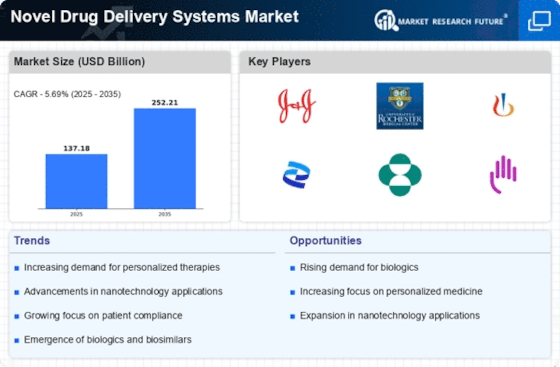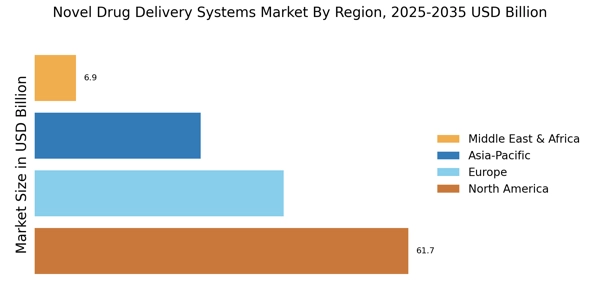Rising Prevalence of Chronic Diseases
The increasing incidence of chronic diseases such as diabetes, cancer, and cardiovascular disorders is a primary driver for the Novel Drug Delivery Systems Market. As these conditions require long-term management and complex treatment regimens, innovative drug delivery systems are essential for improving patient compliance and therapeutic outcomes. According to recent estimates, chronic diseases account for approximately 70% of all deaths worldwide, underscoring the urgent need for effective treatment solutions. The demand for advanced drug delivery mechanisms, including targeted and sustained release systems, is likely to rise as healthcare providers seek to enhance the efficacy of therapies. This trend indicates a robust growth trajectory for the Novel Drug Delivery Systems Market, as stakeholders invest in research and development to address these pressing healthcare challenges.
Growing Demand for Personalized Medicine
The shift towards personalized medicine is significantly influencing the Novel Drug Delivery Systems Market. As healthcare moves away from a one-size-fits-all approach, there is an increasing emphasis on tailoring treatments to individual patient profiles. This trend necessitates the development of drug delivery systems that can accommodate varying dosages and administration routes based on genetic, environmental, and lifestyle factors. The personalized medicine market is anticipated to expand rapidly, with projections suggesting it could reach several billion dollars in the coming years. Consequently, the demand for innovative drug delivery solutions that can effectively deliver personalized therapies is likely to surge. This evolution in treatment paradigms presents a substantial opportunity for growth within the Novel Drug Delivery Systems Market, as companies strive to meet the unique needs of patients.
Technological Innovations in Drug Delivery
Technological advancements play a pivotal role in shaping the Novel Drug Delivery Systems Market. Innovations such as nanotechnology, microencapsulation, and smart drug delivery systems are revolutionizing how medications are administered and absorbed in the body. For instance, the integration of nanotechnology has enabled the development of nanoparticles that can deliver drugs directly to targeted cells, minimizing side effects and enhancing therapeutic efficacy. The market for nanomedicine is projected to reach substantial figures, indicating a growing interest in these technologies. Furthermore, the rise of digital health technologies, including wearable devices that monitor patient health, is likely to complement novel drug delivery systems, creating a synergistic effect that enhances patient outcomes. This convergence of technology and healthcare is expected to drive significant growth in the Novel Drug Delivery Systems Market.
Increasing Investment in Biopharmaceuticals
The surge in investment within the biopharmaceutical sector is a crucial driver for the Novel Drug Delivery Systems Market. As biopharmaceuticals, including monoclonal antibodies and gene therapies, gain traction, there is a corresponding need for sophisticated drug delivery systems that can effectively transport these complex molecules. The biopharmaceutical market is projected to experience substantial growth, with estimates indicating it could surpass significant revenue thresholds in the near future. This growth is likely to stimulate demand for innovative delivery mechanisms that can enhance the stability and bioavailability of biopharmaceuticals. Consequently, the Novel Drug Delivery Systems Market stands to benefit from this trend, as stakeholders seek to develop and implement advanced delivery solutions that meet the unique challenges posed by biopharmaceuticals.
Regulatory Support for Advanced Drug Delivery Systems
Regulatory bodies are increasingly recognizing the importance of advanced drug delivery systems, which is fostering growth in the Novel Drug Delivery Systems Market. Initiatives aimed at expediting the approval process for innovative therapies are being implemented, allowing for faster access to novel drug delivery technologies. For example, the introduction of guidelines that facilitate the development of combination products, which integrate drugs with delivery devices, is likely to enhance market dynamics. This supportive regulatory environment encourages investment in research and development, as companies seek to bring cutting-edge solutions to market. As a result, the Novel Drug Delivery Systems Market is expected to benefit from a more streamlined pathway for product approval, ultimately leading to increased availability of advanced therapies for patients.

















